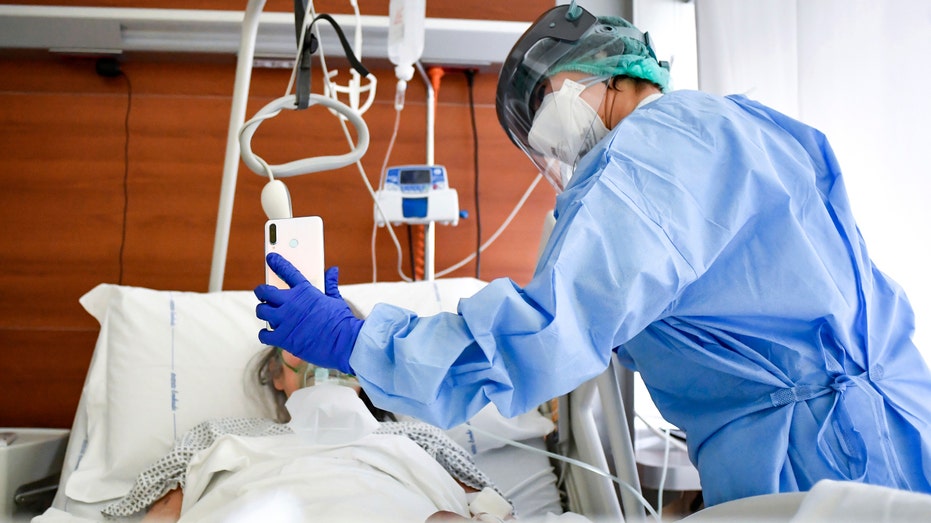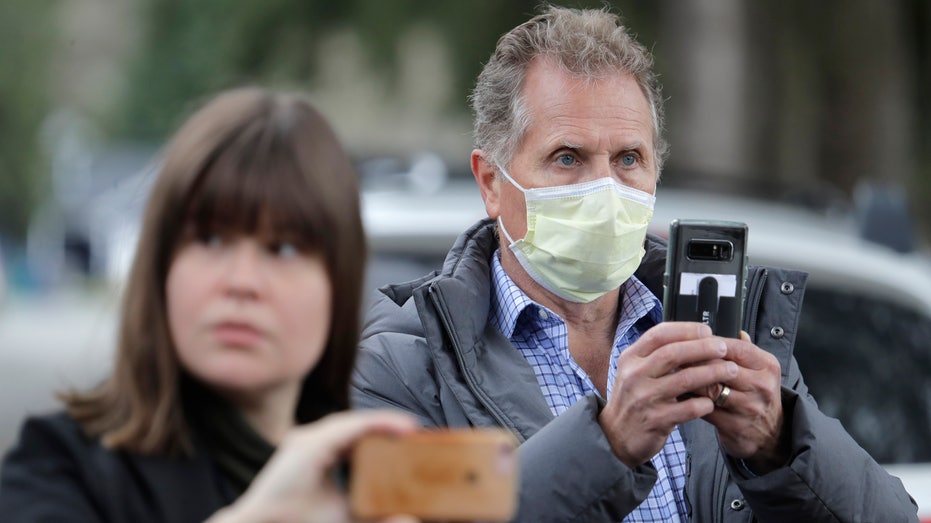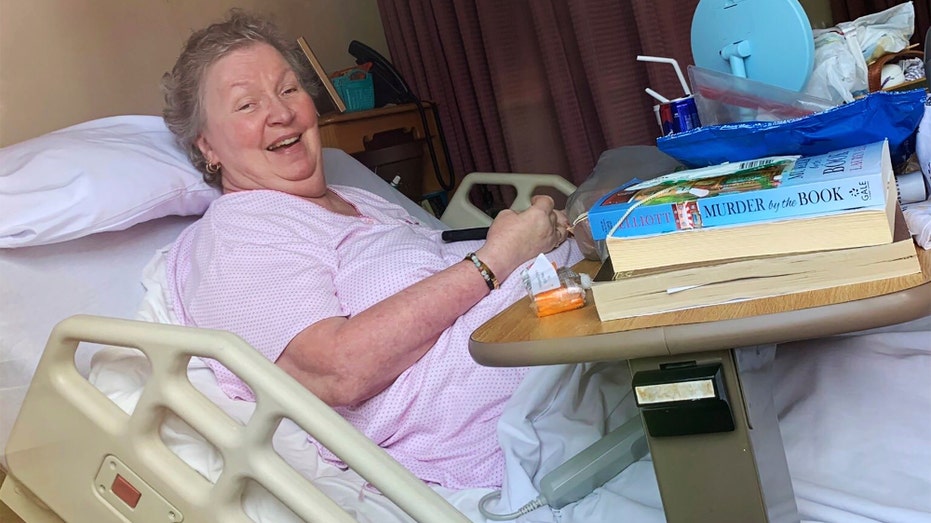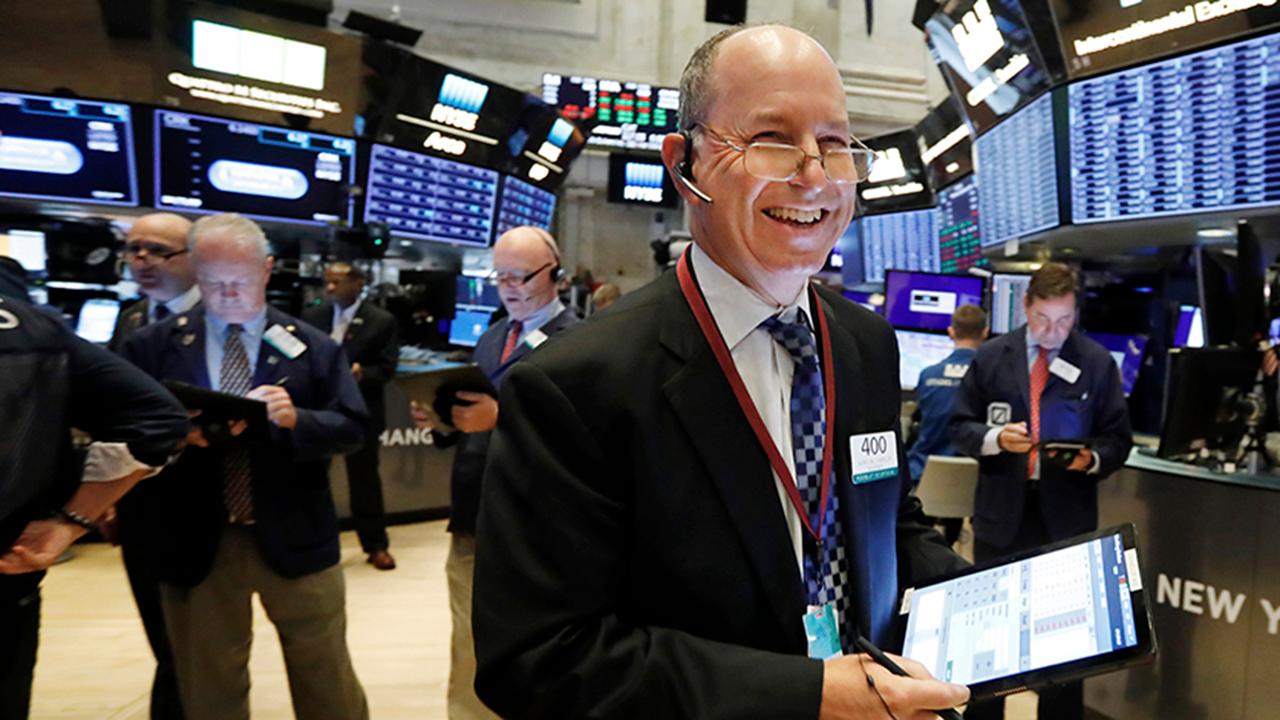Technology emerges as coronavirus hero in hospitals
From telehealth apps to mobile contact tracing to AI tools, technology has emerged as an unlikely hero
Get all the latest news on coronavirus and more delivered daily to your inbox. Sign up here.
Hospitals and health clinics have become increasingly reliant on technology in their fight against the novel coronavirus.
From telehealth apps to mobile contact tracing to artificial intelligence (AI) tools, technology has emerged as an unlikely hero during the pandemic. Social media, too, has worked to connect people to crucial COVID-19 information from trusted sources.
These themes have extended from the general public into health care.
"There's been a general theme of technology," Dr. Royce Lee, who leads the University of Chicago Hospital's new Disaster Recovery Program, told Fox Business. "Technology has literally saved our butts."

A medical staffer holds up a phone in front of a Covid-19 patient for a video call with relatives at Bergamo's Papa Giovanni XXIII hospital, northern Italy, Friday, April 3, 2020. (Claudio Furlan/LaPresse via AP)
Before the pandemic, tech researchers and developers had their eyes set on different goals that were more relevant at the time like self-driving cars, virtual voting tools and quantum computing. But because of the pandemic, tech experts have focused their efforts on creating tools that can trace the spread of coronavirus and possible treatments.
Researchers at the Toronto-based AI platform BlueDot identified COVID-19 on Dec. 31, just hours after local officials in Wuhan, China, reported the city's first diagnoses, but it took the Chinese government weeks to make an official announcement.
Imagine the world's biggest library. AI uses algorithms that could scan through all the books in that library in a fraction of the time that humans would be able to.
IN CORONAVIRUS CRISIS, IT'S TIME TO BACK OFF BIG TECH: CONSUMER TECHNOLOGY ASSOCIATION CEO
BlueDot's AI technology was able to identify coronavirus in just a day when its technology picked up signs of an "unusual pneumonia" coming from a market in Wuhan on social media on Dec. 30, CNBC Make It reported in March.

Scott Sedlacek, right, who says he has tested positive for the COVID-19 coronavirus, wears a mask and uses his phone to film a news conference held March 11, 2020, at the Life Care Center in Kirkland, Wash. (AP Photo/Ted S. Warren)
BlueDot founder and CEO Kamran Khan, who worked as an epidemiologist and physician treating patients in Toronto during the 2003 SARS outbreak, said the purpose of AI and companies that use it like BlueDot is to "spread knowledge faster than the diseases spread themselves."
Beyond AI, hospitals and health care systems have embraced other types of technology such as cloud storage apps like Google Dropbox, workplace organization apps like Citrix and video-conference apps like Zoom and WebEx in accordance with the Health Insurance Portability and Accountability Act (HIPAA).
CONNECTICUT TOWN USES DRONES FOR CORONAVIRUS SYMPTOM-MONITORING
One distinguishing factor of the COVID-19 crisis in comparison to other pandemics is the separation of friends and family. The communication cutoff has made coping and treatment more difficult for patients and health care workers alike, but technology has become something of a saving grace, Lee said.
Video-meeting apps have helped connect friends, family and others to COVID-19 patients who are cooped up in crowded, overworked hospitals that don't allow any physical visitors.
"We're working with our consult liaison service, who are working closely with the ICU to identify cases early, use technology in a new way," Lee said.

In this March 29, 2020, photo provided by Courtney Templeton, her mother, Sharon Templeton, who tested positive for COVID-19, smiles through her room window at Sundale nursing home in Morgantown, W.Va. (Courtney Templeton via AP)
He added that patients who are struggling with loneliness and depression can talk to therapists on an iPad that nurses assemble on stands for patients to see from their beds.
"That has really helped," he said.
GET FOX BUSINESS ON THE GO BY CLICKING HERE
Potential patients, too, can connect with doctors via telemedicine apps that most hospitals and health clinics are now offering to determine whether they are experiencing COVID-19 symptoms before they go out of their way to spend money and time on getting a test.
One Medical is an example of a national care practice with 80 physical locations that connects all patients and doctors via mobile app so they can connect after an in-person visit with questions and updates.
Health care professionals also use apps that act as medical encyclopedias, such as Smart Medical Reference, to quickly lookup information about drugs and labs. Additionally, apps like Trillian and Doximity that connect medical professionals for the same purpose -- to find and discuss answers to hard questions -- are also popular.
CLICK HERE TO READ MORE ON FOX BUSINESS
Technology is rapidly changing hospital and clinic culture, and COVID-19 has encouraged people from all walks of life to be more open to trying new tools that they may have otherwise been opposed to using before the pandemic.
"Everybody is having to do a little bit of IT work just to get through the day," Lee said. "It’s been surprising in a great way."




















